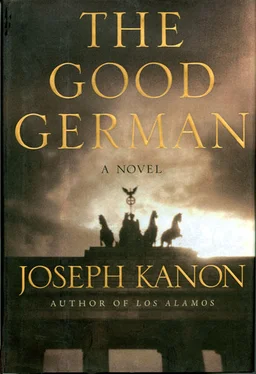Except it wasn’t. Jake looked across the street, shading his eyes again. A piece of the building had been knocked out, but the rest was there, with his corner flat still facing west onto the square. He took a step, elated, then stopped. What would he say? ‘I used to live here and I want to see it again’? He imagined another Frau Dzuris, looking puzzled and hoping for chocolate. A woman came to the window, opening it wider to the air, and for an instant he stopped breathing, straining to see. Why couldn’t it be? But it wasn’t Lena, wasn’t anything like
Lena. A truck went by, blocking the view, and when it passed, the broad back was turned to the window so that he couldn’t see her face, but of course he’d know, just the movement of her arm at the window, even from across the square. He dropped his hand, feeling foolish. A friend of the landlord’s, no doubt, eager to snap up the flat when Hal finally left. Someone who wouldn’t know him, might not even believe he’d been there at all. Why should she? The past had been wiped out with the streets. But the flat was there, real, a kind of proof that everything else had happened too. If he looked long enough, maybe the rest of the square would come back with it, busy, the way it all used to be.
He turned away and caught a glimpse of himself in a broken shard of plate glass from the store window. Nothing was the way it used to be, not even him. Would she recognize him now? He stared at the reflection. Not a stranger, but not the man she had known either. A lived-in face, older, with two deep lines bracketing his mouth. Dark hair thinning back from the temples. A face he saw every day shaving, without noticing it had changed. He imagined her looking at him, smoothing away lines with her fingers to find him. But faces didn’t come back either. They got cluttered with assignments and frantic telegrams, squint“ lines from seeing too much. They’d been kids. Only four years, and look at all the marks. His face was still there, like the flat, but scarred now too, not the one he’d had before. But the war had changed everybody. At least he was here, not dead or turned into a set of initials. POWs. DPs.
He stopped, a tiny, nagging jolt. Initials. He took out the carbon sheets and scanned them again. That was it. He put the top sheet under, glanced over the second, then automatically shuffled for the third and stopped, empty-handed. But Jeanie had had three carbons. He squinted, trying to remember. Yes, three, like a stacked deck. He stood for another minute thinking, then put the sheets away and started up the street again toward the zoo, where small amounts of money were being made. ‹›The driver took him back to Bernie’s office, a small room in the old Luftwaffe building crammed with files and stacks of questionnaires that spilled off the couch and rose in piles on the floor, a mare’s nest of paper. How did he find anything? The desk was worse. More stacks and loose clippings, stale coffee cups, even an abandoned tie-everything, in fact, but Bernie, who was out again. Jake flipped open one of the files, a buff-colored fragebogen like one Lena might have filled out, a life on six typed pages. But this was Herr Gephardt, whose spotless record deserved, he claimed, a work permit.
“Don’t touch anything,” said a soldier at the door. “He’ll know. Believe it or not.”
“Any idea when he’ll be back? I keep missing him.”
“You the guy from yesterday? He said you might be by. Try the Document Center. He’s usually there. Wasserkafersteig,” he said, breaking it into syllables.
“Where?”
The soldier smiled. “Mouthful, huh? If you hold on a sec, I’ll take you-I was just going myself. I can find it, I just can’t spell it.”
They drove west past the press camp to the U-bahn station at Krumme Lanke, where a handful of soldiers and civilians huddled in a miniature version of the Reichstag market, then turned right down a quiet street. At the far end Jake could see the trees of the Grunewald. He thought of the old summer Sundays, with hikers in shorts heading out to the beaches where the Havel widened into the series of bays Berlin called lakes. Today, in the same hot sun, there were only a few people gathering fallen branches and loading them into carts. An axe chipped away at a broad stump.
“Pathetic, isn’t it?” the soldier said. “They chop down the trees when nobody’s looking. There won’t be anything left by winter.” A winter with no coal, according to Muller.
At the edge of the woods, they turned up a narrow street of suburban villas, one of which had been turned into a fortress with a high barbed-wire double fence, floodlights, and patrolling sentries.
“They’re not taking any chances,” Jake said.
“DPs camp out in the woods. Once it’s dark—”
“What’s in there, gold?”
“Better. For us, anyway. Party records.”
He showed a pass at the door, then led Jake to a sign-in ledger in the entrance hall. Another guard was inspecting the briefcase of a soldier on his way out. Neither spoke. The council headquarters had had the busy shoe-clicking hum of a government office. This was quieter, the locked-in hush of a bank. One more ID check took them into a room lined with filing cabinets.
“Christ. Fort Knox,” Jake said.
“Bernie’ll be down in the vault,” the soldier said, smiling. “Counting the bars. This way.”
“Where’d you get it all?” Jake said, looking at the cabinets.
“All over. The party kept everything right to the end-membership applications, court records. Guess they never thought they’d lose. Then they couldn’t destroy them fast enough.” He spread his hand toward the cabinets as they walked. “We got the SS files too, even Himmler’s personal one. The big haul, though, that’s downstairs. Index cards. The central party registry in Munich kept duplicates of all the local cards-every single Nazi. Eight million and counting. Sent them to a paper mill in Bavaria finally, to pulp them, but before the owner could get around to it, the Seventh Army arrived. So, voila. Now we’ve got them. Here we go.” He went down a staircase to the basement. “Teitel, you here? I found your guy.”
Bernie was bent over a broad table whose littered surface was a mirror image of the mess in his office. The room, an alcoved cellar that might once have held wine, was now walled from floor to ceiling with wooden drawers, like card catalogues in a library. When he looked up, his eyes were confused, as if he had no idea who Jake was.
“Sorry to barge in like this,” Jake said. “I know you’re busy. But I need your help.”
“Oh, Geismar. Right. You’re looking for a friend. I’m sorry, I forgot all about it.” He picked up a pen, ready to work.
“Don’t forget to sign him out,” the driver said to Bernie, drifting back up the stairs.
“What was the name?” ‹›“Brandt. But I need something else.” Bernie looked up, his pen still poised to write. Jake pulled out a chair.
“A soldier was killed in Potsdam yesterday-well, killed the day before. He washed up on the conference grounds yesterday. Hear about it?”
Bernie shook his head, waiting. ‹›“No, I guess not,” Jake said, “not down here. Anyway, I was there, so I got interested. He had some money on him, a lot, five thousand, maybe closer to ten. I thought that was interesting too, but apparently I’m the only one. MG just gave me the brush this morning-polite, but a brush. This one came with a lecture. Happens all the time. Black market’s a nickel-and-dime game, no big players. Nobody gets excited when a Russian shoots one of our men, just when they do anything else. So go away, please. Now I’m even more interested. Then I hear the body’s already been shipped back to Frankfurt. That’s a little too efficient, especially for MG. Following me so far?“
Читать дальше












